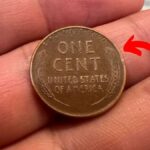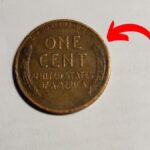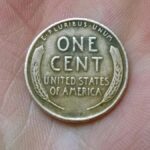The Lincoln Wheat Penny Worth $540 Million: Small things can hold great value, and the Lincoln Wheat Penny proves this perfectly. While most of these old pennies are worth just one cent, some rare versions can be worth hundreds of thousands of dollars. In fact, the combined value of rare Lincoln Wheat Pennies is estimated at $540 million in today’s collector market. That spare change jar on your dresser might contain more than you think!
The Birth of an American Icon
The Lincoln Wheat Penny holds a special place in American history as the first U.S. coin to feature a real person rather than Lady Liberty or other symbols. Minted from 1909 to 1958, these pennies show President Abraham Lincoln’s profile on the front and two wheat stalks on the back, representing America’s farming heritage. This design choice was revolutionary for its time, breaking away from long-standing traditions in American coinage.
The Most Valuable Wheat Penny: A Wartime Mystery
The most famous and valuable Lincoln Wheat Penny was created by accident during World War II. In 1943, the U.S. government ordered the Mint to make pennies from steel instead of copper because copper was needed for military equipment. However, a few copper blanks accidentally made their way into the production line, creating the legendary 1943 Copper Wheat Penny. These rare mistakes are now worth up to $265,000 each, making them some of the most valuable coins in existence.
What Makes Some Wheat Pennies Special
Not all Wheat Pennies are created equal. Their value depends on several important factors. Coins in perfect condition, never used in circulation, are worth much more than worn ones. Experts grade coins on a scale, and those rated MS-65 or higher (meaning they’re in nearly perfect condition) can be worth significant amounts.
Manufacturing mistakes also make some pennies more valuable. These errors include double-stamped dates and letters, off-center designs, and missing mint marks. While these might seem like flaws, collectors prize these unique characteristics because they make each coin one-of-a-kind.
Notable Rare Varieties
Some Wheat Pennies are rare because very few were made. The 1909-S VDB penny is especially valuable because only 484,000 were produced. These coins have the designer’s initials (VDB) on them, making them easy to identify. Another notable variety is the 1922 penny without a Denver mint mark, created when the mint mark wore off the coin die. The 1955 Doubled Die penny, showing obvious doubling of the date and letters, is another highly sought-after variety.
How to Check Your Pennies
If you’re curious about your own pennies, there are several things to look for. First, check the date – any penny from 1909 to 1958 is worth examining more closely. Pay special attention to pennies from 1943. If a 1943 penny doesn’t stick to a magnet, it might be one of the rare copper ones instead of the normal steel version.
Look for letters called mint marks on your pennies. A “D” means the coin was made in Denver, while “S” indicates San Francisco. No mark means the coin came from Philadelphia. The condition of the penny matters too. The best ones still have their original reddish color (called “Red” by collectors). Pennies that have turned partially brown (“Red-Brown”) or completely brown are worth less but can still be valuable if they’re rare dates.
What to Do with a Valuable Find
If you think you’ve found a valuable Wheat Penny, don’t clean it! Cleaning can significantly reduce a coin’s value. Instead, consult an expert coin dealer or professional numismatist (coin expert) for evaluation. They can tell you if your coin is genuine and valuable.
For valuable coins, getting them professionally graded is important. Companies like PCGS and NGC examine coins carefully and seal them in protective cases with official grades. This certification makes coins easier to sell and can increase their value because buyers trust these professional grades.
The Historical Significance
Lincoln Wheat Pennies are more than just potentially valuable collectibles – they’re pieces of American history. These coins were in people’s pockets during major historical events like World War I, the Great Depression, and World War II. The 1943 steel pennies particularly show how America adapted during wartime, using different metals to support the war effort.
The design itself tells an American story. Abraham Lincoln’s profile represents leadership during difficult times, while the wheat stalks symbolize America’s agricultural strength and abundance. These simple images carried powerful meaning for people using these coins in their daily lives.
Collecting as a Hobby
Collecting Wheat Pennies has become a popular hobby because it combines history, treasure hunting, and the possibility of finding valuable coins. Many collectors start by checking their pocket change and gradually learn more about coin collecting. This hobby can be educational, teaching about American history, economics, and the art of coin making.
Protecting Your Finds
If you discover valuable Wheat Pennies, proper storage is crucial. Keep them in special coin holders or albums that protect them from damage. Store them in a place with consistent temperature and humidity, away from extreme conditions that could harm them. Never try to clean old coins – even gentle cleaning can damage their surfaces and reduce their value.
The Future of Wheat Penny Collecting
As time passes, Lincoln Wheat Pennies become increasingly scarce, potentially making them more valuable. While not every Wheat Penny will be worth a fortune, their historical importance and the thrill of possibly finding a rare variety continue to attract new collectors.
The possibility that valuable coins might be hiding in ordinary pocket change makes Wheat Penny collecting exciting. Whether you’re a serious collector or just someone who enjoys history, these small pieces of copper tell fascinating stories about America’s past while holding the potential for unexpected value.
Remember to examine your loose change carefully – you never know when you might find one of these historical treasures. While most Wheat Pennies are worth only a few cents, the possibility of finding a rare variety worth thousands keeps collectors searching through their spare change, hoping to discover their own piece of numismatic history.








